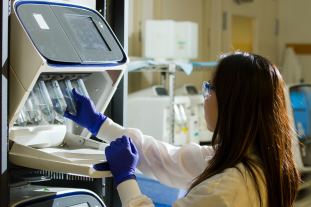One of the research teams from The University of Texas, Austin, has successfully demonstrated an all-new process of protein sequencing that happens to be more sensitive than the already-existing technology. Moreover, such a way also helps identify molecules of an individual protein, instead of processing a million molecules simultaneously. The new biological advancement proves to be impactful in the field of research. It also makes it efficient and competent enough to disclose the latest biomarkers to diagnose cancer and many other diseases. Furthermore, they also enhance the primary understanding of the way healthy cells function.
The co-inventor of this all-new technology and molecular biosciences professor, Edward Marcotte, says that his team has substantially formed a new technology like DNA sequencing to study proteins.
Protein Sequencing

Image credit: National Cancer Institute (Source: unsplash.com)
The researchers started working on this project around half a decade ago when the professor and his colleagues first thought of envisioning adopting these new methods of the next-gen way of protein sequencing from gene sequencing. The next-gen gene sequencing happens to be a series of techniques, making the process of sequencing a whole genome of every living organism accurate, fast, and affordable. This has accelerated the biological research, and for the rest, has enabled genetic testing at home for disease and ancestry.
In the same way that these earlier advances provided quick and comprehensive information about thousands of genes that influence human health, this all-new technology helps in providing detailed information and insights about thousands of proteins, playing a vital role in diseases or healthy functioning. Such a process happens in the same way that previous advances produced comprehensive and quick information on several genes that influenced human health. In several disorders like Alzheimer’s, cancer, diabetes, and heart failure, the cells that produce proteins and many other substances behave as distinctive biomarkers, similar to fingerprints. The enhanced detection of such unique biomarkers ends up helping researchers to understand the causes that lead to disorders or many accurate diagnoses for the patients.
Moreover, this new ultra-sensitive method of identifying amino acids in protein sequencing can help in accelerating research conducted on biomarkers for diseases like cancer and many others.
The present lab standard of protein sequencing that uses mass spectrometry tools does not happen to be sensitive enough for several applications. Moreover, it can help in detecting protein only if a million copies of it are present. Also, it comes with “low throughput,” which means it can work to identify a few thousand types of distinct protein in one sample.
With the all-new method of one-molecule fluoro sequencing, the researchers working on the project can move in the direction of sequencing individual protein molecules in millions, simultaneously in one sample. Moreover, the professor believes that with future refinements, molecular numbers that could earlier get detected in samples can now reach into the figures close to a billion.
Final Thoughts
With a significant sensitivity and a higher throughput than the already-existing technology, the new tool will allow them to detect the biomarkers of specific diseases. Moreover, it will enable them to carry out their studies on diseases like cancer in an entirely enhanced way. For instance, researchers can now look at cell-by-cell to acknowledge how tumors evolve from meager identical cells’ mass to genetically different cells. And, this happens with its weaknesses and strengths. This kind of information and insight can inspire some of the novel ways to fight and neutralize cancer.
